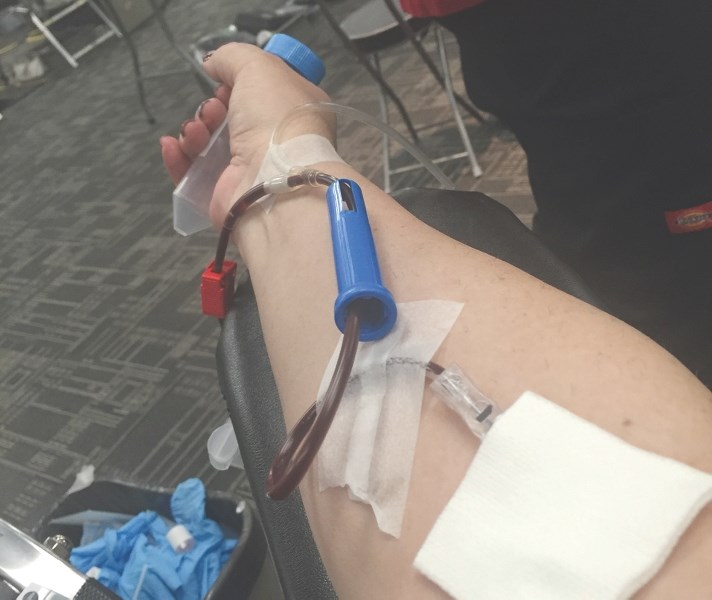Firefighters, paramedics and police officers are known for saving lives every day. But during the month of January, they are doing it in a different way.
Sirens for Life Alberta Challenge, unveiled at Canadian Blood Services (CBS) in Edmonton this past Wednesday, is a call to help save lives. Throughout the entire month of January, Edmonton and area first responders have challenged Calgary first responders to collect as many blood donations as possible.
In 2023 Calgary’s first responders and general population led with 6,000 plus units to Edmonton’s 5,500 plus units. Calgary also took the lead in 2022, however exact figures were unavailable.
“We’re doing better every year. We’re going up. And that’s why we need St. Albert to help with those numbers,” said Tianna Doyle, CBS territory manager. The challenge is extended not just to first responders, but to anyone in the public interested in helping others.
“Our goal is to collect more than 5,000 units of blood and recruit 470 new donors,” she added.
After the holiday rush, CBS typically sees a slump in donations. The national inventory can take a significant drop for various reasons. Some people are on vacation, while others fall ill and cancel appointments. Icy road conditions and cold weather also deter individuals from donating.
However, patients receiving cancer treatments, victims of automobile collisions, industrial accidents, fires and medically necessary surgeries continue to require life-sustaining blood components.
All donated blood can be split into three products, thereby assisting three patients. Blood is administered to patients in car accidents.
“A man or woman in a car accident can require up to 50 units of blood. That means 50 people have had to donate blood.”
Plasma is given to burn patients and to treat immune deficiencies, while cancer and leukemia patients receive platelets.
Collecting blood takes anywhere from 35 minutes to an hour, and that includes enjoying a snack and juice after the procedure. Once blood is collected, it is sent to a laboratory for testing. After 72 hours (about 3 days), it is broken down.
Despite the care taken to preserve the three products, they have a different set of parameters and a shelf life. Red blood can be stored for 42 days (about one and a half months), whereas platelets only survive seven days. Plasma, however, can be frozen for up to a year.
All blood types are needed, however O Negative is the universal donor. In an emergency situation, it can be administered to anyone.
“It’s in all ambulances and STARS helicopters. It’s commonly used in emergency situations. If you haven’t been tested, we give you O Negative,” said Doyle.
To reach its monthly target, the Edmonton region requires about 4,000 units on an ongoing basis.
“I really want to stress we need people to donate. If you are eligible to donate, we ask you visit the Canadian Blood Services website and make an appointment.”
CBS is hosting three blood drives at St. Albert Inn on Jan. 24, 30 and 31. To book an appointment, visit blood.ca or call 1-888-236-6283.




